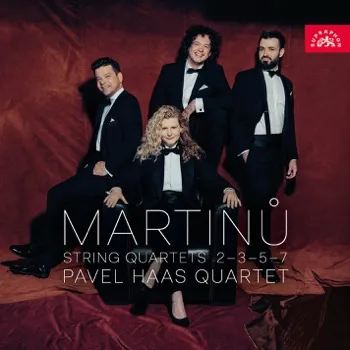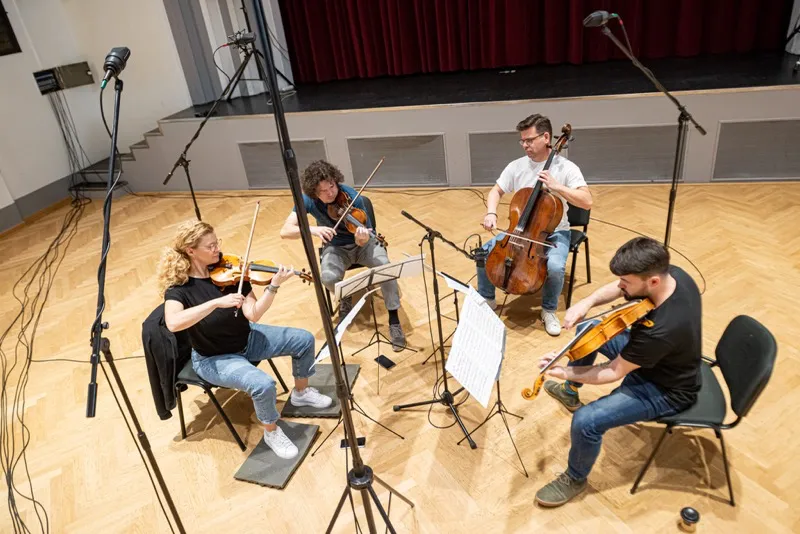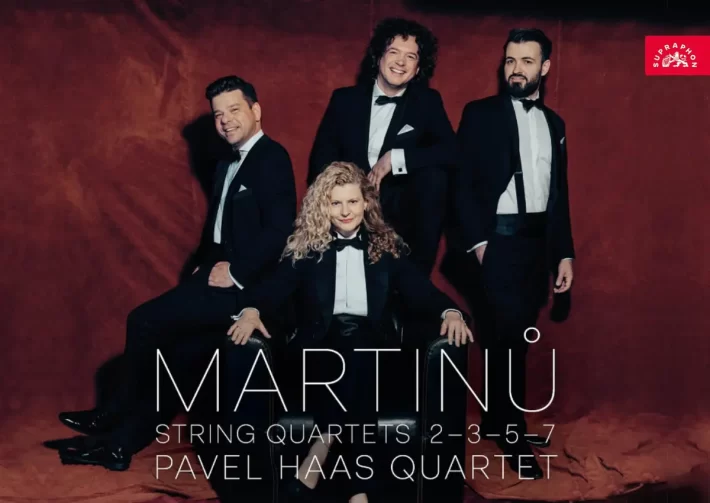Bohuslav Martinů’s string quartets still feel underappreciated, too often grouped with Janáček or framed by comparisons that dilute their character. This new release by Pavel Haas Quartet argues for the music on its own terms. The program is presented non-chronologically—String Quartet No. 5, No. 3, No. 7, and No. 2—and it arrives after a three-year pause in the ensemble’s discography. Despite changes in the second violin and viola, the group’s profile remains intact: a taut, vividly projected sound centered by violinist Veronika Jarůšková and cellist Peter Jarůšek. The engineering is first-rate and offered in Dolby Atmos, which helps clarify Martinů’s layered textures.

No. 5 makes an assertive opening. Jarůšková’s first violin lines have the focus and presence that demand attention, yet the performance’s appeal lies in the collective dialogue: the inner parts are alive, with notable viola and cello responses that keep the musical argument balanced. In the Lento the quartet relaxes into true quiet playing—hushed, steady, and without self-conscious shaping. Among available recordings of the Fifth, this reading now sits at the top of the pile for its combination of precision, drive, and recording quality.
The more overtly modernist No. 3 finds the quartet emphasizing edge and contrast. Compared with the Martinů Quartet on Naxos, whose uniform blend gives homogeneity to chordal writing, Pavel Haas favors sharper profiles in counterpoint and a larger dynamic canvas. There are moments when latitude in intonation is the cost of that urgency, but the trade-off suits the piece’s volatile rhetoric.
In the finale, the Doric Quartet on Chandos still has a certain mystery—more varied bow strokes and subtler color inflections—yet the new album has the more convincing balance. In the Andante, the Doric supplies characterful shading; Pavel Haas offers a more integrated line. Both interpretations stand on their own, bringing out complementary facets of the piece.
With No. 7, often labeled as too “civilized” or neo-classical, the Pavel Haas sidesteps prettiness. Where performances such as the Talich Quartet (also on Supraphone) can turn sunny, this one carries an underlying tension. The slow movement resists romantic glow; phrases are shaped with restraint and the harmonic turns register without extra emphasis.

Pavel Haas Quartet (Image: ©️ Lukáš Kaderábek)
The Kocian Quartet (Praga) brought a wilder edge to the Second String Quartet, and that volatility still registers in memory; in the new recording, the playing is more polished, with cleaner and tighter ensemble work. Compared with the Martinů Quartet, whose even blend aids chordal unanimity but can blur lines, Pavel Haas stresses distinct voices so that polyphony speaks. The finale has bite without tipping into breathlessness; accents are firm, and the quasi-classical episodes read as part of the argument rather than a nostalgic detour.
Overall, Pavel Haas offers a strong case for the Martinů String Quartets. The high intensity, sometimes over-the-top on their Schubert album, feels warranted by the nature of Martinů’s writing. Supraphone’s own Panocha cycle remains valuable historically, though the earlier sonics do not flatter the inner detail that the present recording captures so readily. For listeners who have yet to be convinced by these works, this is highly recommended. Hopefully, the group will record Nos. 1, 4 and 6 to complete the cycle.
Recommended Comparisons
Panocha | Martinů (2) | Martinů (3) | Martinů (5,7) | Doric (3)

Album Details |
|
|---|---|
| Album name | Martinů – String Quartets 2-3-5-7 |
| Label | Supraphone |
| Catalogue No. | SU 4368-2 |
| Artists | Pavel Haas Quartet |



















